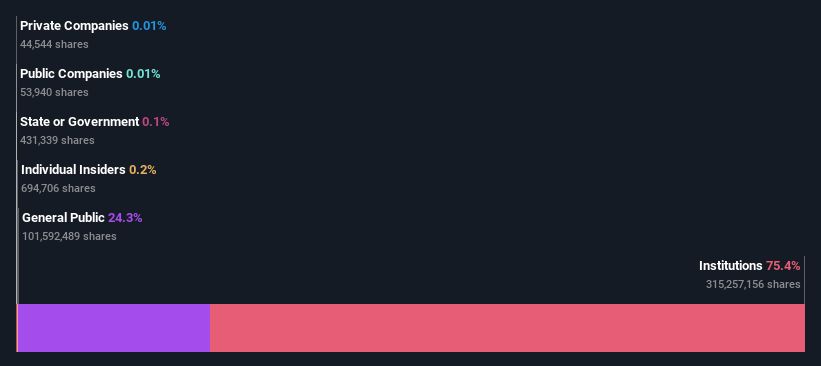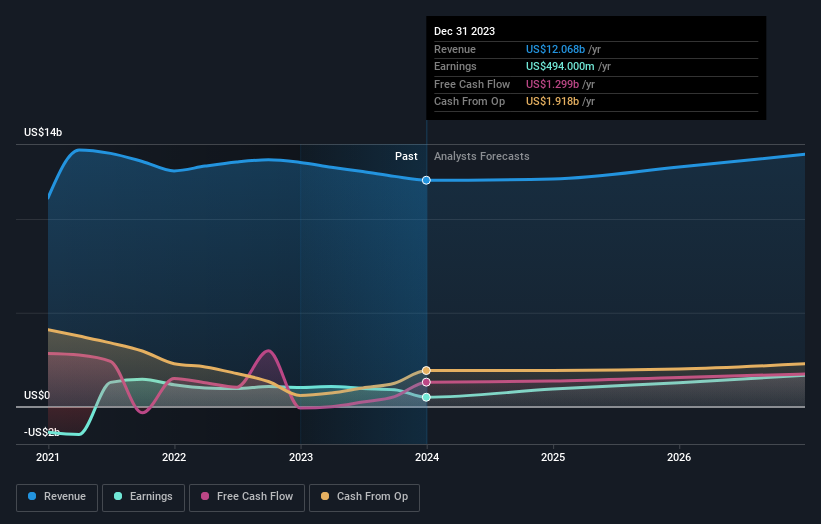DuPont de Nemours, Inc. (NYSE:DD) down to US$31b market cap, but institutional owners may not be as affected after a year of 5.4% returns
Key Insights
Institutions' substantial holdings in DuPont de Nemours implies that they have significant influence over the company's share price
50% of the business is held by the top 25 shareholders
To get a sense of who is truly in control of DuPont de Nemours, Inc. (NYSE:DD), it is important to understand the ownership structure of the business. And the group that holds the biggest piece of the pie are institutions with 75% ownership. Put another way, the group faces the maximum upside potential (or downside risk).
Institutional investors endured the highest losses after the company's market cap fell by US$1.2b last week. However, the 5.4% one-year return to shareholders may have helped lessen their pain. But they would probably be wary of future losses.
In the chart below, we zoom in on the different ownership groups of DuPont de Nemours.
Check out our latest analysis for DuPont de Nemours
What Does The Institutional Ownership Tell Us About DuPont de Nemours?
Institutions typically measure themselves against a benchmark when reporting to their own investors, so they often become more enthusiastic about a stock once it's included in a major index. We would expect most companies to have some institutions on the register, especially if they are growing.
We can see that DuPont de Nemours does have institutional investors; and they hold a good portion of the company's stock. This suggests some credibility amongst professional investors. But we can't rely on that fact alone since institutions make bad investments sometimes, just like everyone does. It is not uncommon to see a big share price drop if two large institutional investors try to sell out of a stock at the same time. So it is worth checking the past earnings trajectory of DuPont de Nemours, (below). Of course, keep in mind that there are other factors to consider, too.
Investors should note that institutions actually own more than half the company, so they can collectively wield significant power. We note that hedge funds don't have a meaningful investment in DuPont de Nemours. The company's largest shareholder is The Vanguard Group, Inc., with ownership of 11%. BlackRock, Inc. is the second largest shareholder owning 7.3% of common stock, and Massachusetts Financial Services Company holds about 5.3% of the company stock.
After doing some more digging, we found that the top 25 have the combined ownership of 50% in the company, suggesting that no single shareholder has significant control over the company.
While studying institutional ownership for a company can add value to your research, it is also a good practice to research analyst recommendations to get a deeper understand of a stock's expected performance. There are plenty of analysts covering the stock, so it might be worth seeing what they are forecasting, too.
Insider Ownership Of DuPont de Nemours
The definition of an insider can differ slightly between different countries, but members of the board of directors always count. Management ultimately answers to the board. However, it is not uncommon for managers to be executive board members, especially if they are a founder or the CEO.
Most consider insider ownership a positive because it can indicate the board is well aligned with other shareholders. However, on some occasions too much power is concentrated within this group.
Our most recent data indicates that insiders own less than 1% of DuPont de Nemours, Inc.. It is a very large company, so it would be surprising to see insiders own a large proportion of the company. Though their holding amounts to less than 1%, we can see that board members collectively own US$51m worth of shares (at current prices). It is always good to see at least some insider ownership, but it might be worth checking if those insiders have been selling.
General Public Ownership
The general public-- including retail investors -- own 24% stake in the company, and hence can't easily be ignored. While this group can't necessarily call the shots, it can certainly have a real influence on how the company is run.
Next Steps:
I find it very interesting to look at who exactly owns a company. But to truly gain insight, we need to consider other information, too. Case in point: We've spotted 3 warning signs for DuPont de Nemours you should be aware of.
Ultimately the future is most important. You can access this free report on analyst forecasts for the company.
NB: Figures in this article are calculated using data from the last twelve months, which refer to the 12-month period ending on the last date of the month the financial statement is dated. This may not be consistent with full year annual report figures.
Have feedback on this article? Concerned about the content? Get in touch with us directly. Alternatively, email editorial-team (at) simplywallst.com.
This article by Simply Wall St is general in nature. We provide commentary based on historical data and analyst forecasts only using an unbiased methodology and our articles are not intended to be financial advice. It does not constitute a recommendation to buy or sell any stock, and does not take account of your objectives, or your financial situation. We aim to bring you long-term focused analysis driven by fundamental data. Note that our analysis may not factor in the latest price-sensitive company announcements or qualitative material. Simply Wall St has no position in any stocks mentioned.


